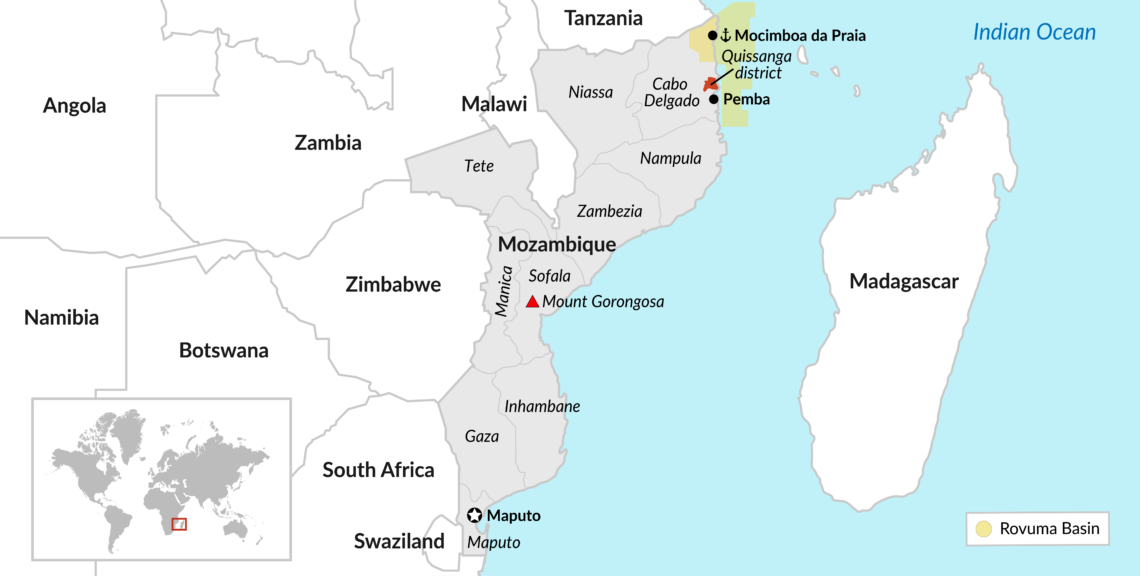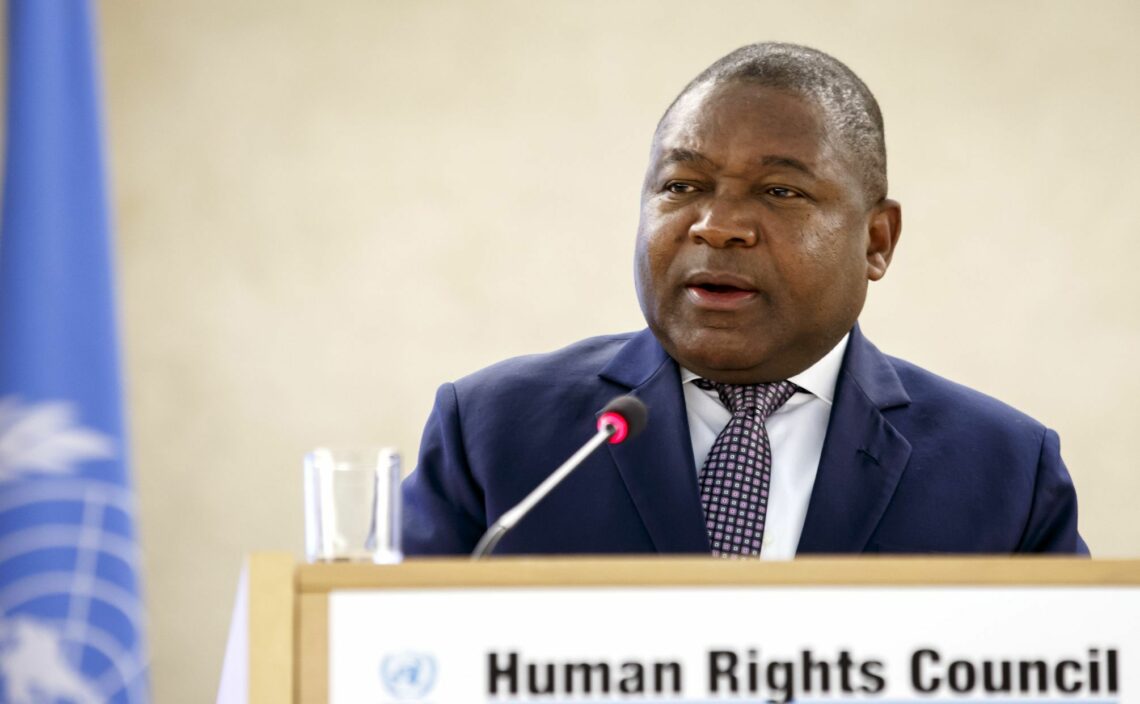Mozambique’s economic recovery faces tough challenges
Despite the death of the opposition’s leader, Mozambique implemented reforms that would end years of political violence. The country is rich in natural gas and has agricultural potential, but a financial scandal and terrorism are holding it back. Until these problems are resolved, its much-anticipated economic boom will never materialize.

In a nutshell
- Mozambique has achieved a political breakthrough
- Its economy has huge potential due to its natural resources
- A debt scandal and terrorist violence are holding the country back
Mozambique, one of southern Africa’s most promising economies, is yet again at a crossroads. It is rich in natural resources, but political uncertainty, financial crisis and the threat of jihadist terrorism could discourage investors and delay the country’s long-awaited economic boom.
Politics: breakthroughs and setbacks
In August 2017, a new political dynamic was set in motion when President Filipe Nyusi, the leader of the ruling Mozambique Liberation Front (Frelimo), met with his main rival, Afonso Dhlakama, the head of the Mozambican National Resistance (Renamo) party. This was their first meeting since military hostilities between the two sides escalated in 2014. Several other meetings ensued, aimed at reaching an agreement that could finally open the door to national reconciliation.
Political and administrative decentralization (giving opposition parties the opportunity to rule at the local level) and Renamo’s demilitarization, demobilization and integration of its armed militants into Mozambique’s security apparatus were the pivotal topics in the negotiations. The direct personal contact between the two leaders was decisive in driving the peace process forward.
But on May 3, Dhlakama died, aged 65, of diabetes. He had been hiding on Mount Gorongosa, in Sofala Province, in central Mozambique, and had not left his base since 2015 following a series of attempts on his life. The disease had worsened in recent months due to his isolation.
Dhlakama’s death came at a time when the National Assembly was about to discuss the constitutional reform needed to push the decentralization process forward. The changes had been negotiated directly between President Nyusi and Mr. Dhlakama, accommodating some of Renamo’s longtime political demands. Now, not only was the constitutional agreement in danger, there was a serious risk that the peace negotiations could suffer a setback.
Frelimo will maintain its grip on local government for the next few years.
The combination of the power vacuum within (the still heavily armed) Renamo and the possibility of Frelimo withdrawing from its commitments brought the very real threat that armed conflict could reignite. However, on May 23, the constitutional changes were approved unanimously by the National Assembly, the country’s legislature.
The vote followed direct negotiations between President Nyusi and General Ossufo Momade, who has been leading Renamo since Dhaklama’s death. President Nyusi guaranteed that the concessions agreed upon earlier would not change, while General Momade gave assurances that he had full control over Renamo’s military wing, reducing the risk of new armed attacks.
The negotiations within parliament proved more difficult, especially regarding the designation of the district administrators, who exercise political power at the local level.
According to the amendment, during a five-year transition period (2019-2024) the administrators will be appointed by the minister of state administration (meaning Frelimo, at least until the 2019 elections) after consultations with the provincial governor (who in some provinces could be elected by the opposition). After the transition period, the local administrators will be elected. Since the minister of state administration will not be required to heed the provincial governor’s advice, Frelimo will maintain its grip on local government for the next few years.
This solution did not entirely satisfy Renamo and the other opposition party, the Democratic Movement of Mozambique (MDM), but it was considered preferable to a crisis followed by a failure in the peace negotiations. At this stage, the final agreement still depends on Renamo’s armed wing relinquishing its weapons. Membership in these militias is somewhere between 600 and 2,000.
Economic downturn
That common sense prevailed in politics is good news for a country burdened with some big economic challenges. One of the most difficult is the country’s still unresolved “ghost loan” crisis. A complex, opaque and fraudulent operation carried out in the last years of President Armando Guebuza’s term (2005-2015) is estimated to have pulled in about $2 billion in loans. Three state-owned companies – Ematum (a tuna fishing company), the security firm Proindicus and Mozambique Asset Management (also known as MAM) – received huge loans backed by state guarantees. Credit Suisse and Russia’s VTB Group organized and sponsored the operation. The companies were unable to pay off the debt, which was converted into government bonds, leaving the state budget on the hook. The government has yet to give a clear explanation as to where the money went and who benefited.

This disastrous operation led to a downgrade of Mozambique’s credit rating and the suspension of some financial assistance from the International Monetary Fund (IMF) and other foreign donors – a crucial supplement to the country’s budget. Since then, analysts have continuously revised downward Mozambique’s prospects for economic growth.
The crisis was a major blow to the country’s economic recovery, which was expected to get a boost from the natural gas ventures off the coast of the northern province of Cabo Delgado. Big energy companies like ExxonMobil, Texas-based Anadarko, China National Petroleum Corporation (CNPC), South Korea’s Kogas, Thailand’s PTT, Italy’s ENI and Portugal’s Galp all have operations there, in the Rovuma Basin.
With proven reserves of 2.8 trillion cubic meters (14th-largest in the world and third in Africa, after Nigeria and Algeria), the natural gas discoveries could significantly boost Mozambique’s exports in the medium term. The government recently announced that gas extraction and liquefaction operations in the Rovuma Basin are expected to begin in 2022. But new threats could delay this schedule.
Jihadist-inspired terrorism
For years, abductions and political assassinations were the most significant challenges to Mozambique’s security. Recently, however, they seem to have become much less frequent, suggesting President Nyusi has tightened his control over the security apparatus. Currently, the most pressing security threat is in Cabo Delgado. Since October 2017, radical armed Islamist groups have been destabilizing the area through indiscriminate attacks, assassinations and looting.
Jihadist-inspired terrorist attacks have been increasing, both in number and in the degree of violence. On May 26, an armed group killed a dozen people, including women and children. These were extremely brutal summary executions. On June 6, another attack occurred in the Quissanga district. It was the fourth in a two week-period, raising the death toll to at least 30 people. Eleven suspected members of the armed groups were also killed. Initially operating in the extreme north, the terrorists have been moving southward, getting closer to Pemba, the capital of the Cabo Delgado province.
Ethnic, religious and social factors are the main causes of the terrorist violence.
Local intelligence sources, but also Western military and intelligence attachés in Mozambique’s capital, Maputo, say ethnic, religious and social factors are all behind the violence. The coastal population mainly consists of the Mwani ethnicity, a sub-branch of the Makua people, who speak a dialect of Swahili. Some time ago, young people from the Mwani villages started migrating north from the countryside to Tanzania, Kenya, Sudan and Somalia. Some are even said to have gone to Saudi Arabia’s Wahhabi centers and mosques for indoctrination, leaving behind their “moderate” Sufi brand of Islam and embracing a more radical, orthodox Wahhabist approach.
Many of these young people returned in mid-2017. In October, they occupied Mocimboa da Praia, storming police stations and terrorizing the population. Government reaction was tough – closing mosques, arresting hundreds of suspects and harassing young men with beards and women with burkas – but ineffective. The degree of violence and the pattern of recent attacks suggest a growing radicalization and reveal the government’s difficulty in responding, particularly in the areas where international oil and gas companies are expected to set up their onshore operations. The firms will bring in expensive equipment and hundreds of employees, many of them expatriates, whose security must be guaranteed.
Agriculture: lost opportunities
Even with the potential benefits from gas projects, rising coal output and recent discoveries of precious gemstones such as rubies, agriculture is still a very important part of the country’s economy. It accounts for about 25 percent of gross domestic product (GDP), and 70 percent of Mozambicans live and work in rural areas.
Crops account for about 80 percent of the agriculture sector’s output. Cassava, maize and sugarcane are among the main crops; cashews are also a significant export commodity.
Mozambique is a net importer of food – a shocking fact considering the country’s agricultural potential.
Compared with the enthusiasm for Mozambique’s energy and mining sectors, there is far less interest in investment in agriculture. In this sense, the country’s resources are being underutilized. Only 15 percent of the country’s 36 million hectares of arable land is cultivated, while only 50,000 hectares of a total 3.3 million hectares of irrigable land is utilized. Land poverty is a serious obstacle to agricultural development (and economic development in general). Until the 1990s, the country was a communist regime in which all land belonged to the state.
Mozambique is a net importer of food – a shocking fact considering its agricultural potential. Its vast expanses of arable land and rich soil, along with ample water for irrigation from its large rivers and abundant tropical rainfall, are natural assets that could give it a strong farm sector. For now, the country is at the mercy of oscillating food prices in international markets, especially of rice and wheat.
One of the most important ongoing agricultural ventures is being implemented by Portucel Mocambique, a subsidiary of the Navigator Company, a cellulose and paper firm based in Portugal. The project will invest $2.3 billion and employ 7,000 people to develop forest for paper pulp. It has a 50-year concession on approximately 360,000 hectares in the provinces of Zambezia and Manica, with the possibility of renewal. It may also lease large stretches of land for farming and export.
Scenarios
Negative outlook
The suspension of aid to Mozambique is hamstringing an economy already suffering from an extremely restrictive monetary policy adopted by the central bank. The European Central Bank, despite its declared intention to help Africa, has made it difficult for potential investors, requesting high levels of collateral and strong guarantees.
This economic pressure, combined with the growing of terrorism in the north and the consequent delays in energy projects, could throttle Mozambique’s economic recovery. The ghost loans crisis and tight monetary policies are also key obstacles to development. High interest rates are asphyxiating medium-sized companies, mainly managed by families from the Indian and Pakistani diaspora.
Positive outlook
Under a more optimistic scenario, President Nyusi, with the cooperation of the opposition parties, would be able to maintain and strengthen the peace settlement with Renamo. His government would give clear, credible answers to the many questions creditors have about the ghost loans scandal, while punishing the responsible parties. Additionally, he would find a way to tamp down extremist activity in Cabo Delgado and convince the central bank to ease its restrictive policies.
These developments would lead to a quick reversal of the country’s economic downturn, which shrank the country’s GDP from $16.9 billion in 2014 to an estimated $12.7 billion in 2017, according to IMF estimates.







